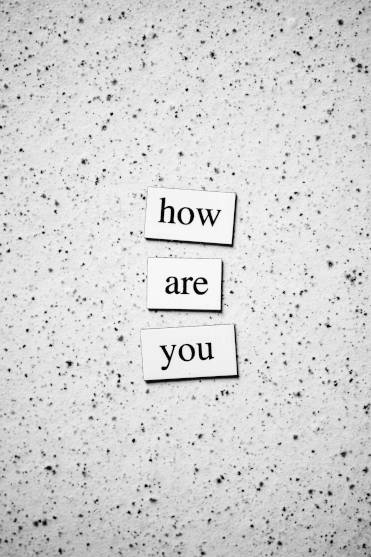The ubiquitous phrase "How are you?" has woven itself into the fabric of daily conversation. It's a standard greeting, a social nicety, often uttered without much expectation for a genuine response. But what if we actually answered with the truth? What if this seemingly innocuous question was met with raw honesty?
It feels very rare that someone honestly and genuinely asked me how I am and my honest answer did not overwhelm them. Just a handful of people I know don´t use it just as a phrase but have genuine interest.
Since more and more people are not ready or prepared to actually hear an honest and emotional answer, I tend to struggle with the level of honesty I should face people with. And after trying to give a honest answer a few times that got wildly rejected or downplayed, I chose often to just answer with the same deepness the question was ask, exactly non (meaning I automatically say "I am good").
In today's fast-paced world, "How are you?" has become more of a rhetorical question than a genuine inquiry into someone's well-being. It's a default script, a social convention that we've grown accustomed to. We've mastered the art of replying with a perfunctory "I'm fine, thank you," even when our hearts might ache or our minds are burdened with worries.
But consider for a moment the potential power in answering authentically. What if we dared to respond honestly, sharing our true emotions, whether they're joyous, melancholic, or somewhere in between? Would this simple shift in dialogue pave the way for more meaningful connections?
The truth is, embracing vulnerability in our interactions could foster deeper human connections. The more we close down the more we disconnect. Sharing our genuine feelings allows us to be seen, heard, and understood. It breaks down the walls of pretense and invites empathy. When we open up about our joys, fears, and struggles, we create a space for genuine connection and support. But not everyone is ready for that or wants this kind intimacy. Everyone seem nowadays so busy with their selves that there is barely room for the other person or their emotions.
Now, imagine extending this authenticity beyond the surface-level inquiry of "How are you?" and delving into the question, "Are you happy?" It's a query that strikes at the core of our emotional well-being, inviting a level of introspection and honesty that transcends societal norms. This question is new, different and surprising so it can often not just be wiped away.
Exactly this question has the power to get you out of this superficial "How are you" routine. It tends to make people think. Asking someone if they're happy is an invitation for reflection, a chance to delve into the intricacies of our emotions and experiences. It encourages us to ponder our state of contentment, our sources of joy, and areas where we might seek fulfillment. Moreover, it signals a willingness to engage in deeper, more meaningful conversations about what truly matters in life.
The beauty of this question lies not just in it´s words but in the space it creates for genuine human connection. It encourages us to listen actively, to empathize, and to support one another through life's ups and downs. By embracing authenticity in our interactions and daring to ask and answer with honesty, we can build stronger, more empathetic communities where people feel genuinely seen and understood.
In a world where surface-level conversations often dominate, the power of genuine inquiry and heartfelt responses has the potential to bridge emotional gaps and bring us closer together, one honest conversation at a time. What about you start with your friends and with giving their answer real room. It might change something for the good.
I, for sure, have to force myself too but I also want to take this as a chance to evaluate my relationships, who I want to open up to and who has genuine interest in the things that move my heart and soul. For the rest it´s fine to keep it on the surface.
xx baj.

